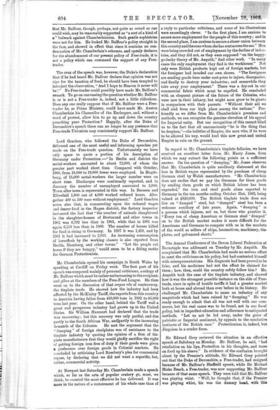At Newport last Saturday Mr. Chamberlain made a speech which,
so far as the arts of popular oratory go, must, we think, be counted the most effective he has delivered. It was more in the nature of a restatement of his whole case than of
a reply to particular criticisms, and some of his illustrations were exceedingly clever. "In the first place. I am anxious to secure more employment for the people of this country; and in the second place, I am anxious to secure a closer union between this country and the sons whom she has sent across the sea." Men were being crowded out of employment by the decline of indus- tries, and they did not, as they were supposed "on the happy- go-lucky theory of Mr. Asquith," find other work. "In many cases the only employment they find is the workhouse." Not only were British products kept out of foreign markets, but the foreigner had invaded our own shores. "The foreigners are sending goods here under cost-price to injure, disorganise, and finally to destroy your industries ; and meanwhile they take away your employment." There was a dry-rot in our commercial fabric which must be expelled. He concluded with an eloquent picture of the future of the Colonies, who were now in their infancy, but might soon grow to be giants in comparison with their parents. "Without their aid we shall sink from our high place among the nations." Pro- foundly as we differ from Mr. Chamberlain's premises and methods, we can recognise the genuine elevation of his appeal for Imperial unity. But our recognition of this cannot blind us to the fact that all unconsciously "he is the thing that be despises,"—the belittler of Empire, the man who, if he were to be allowed his way, would hurl this now great and united Empire in ruin on the ground.


















































 Previous page
Previous page